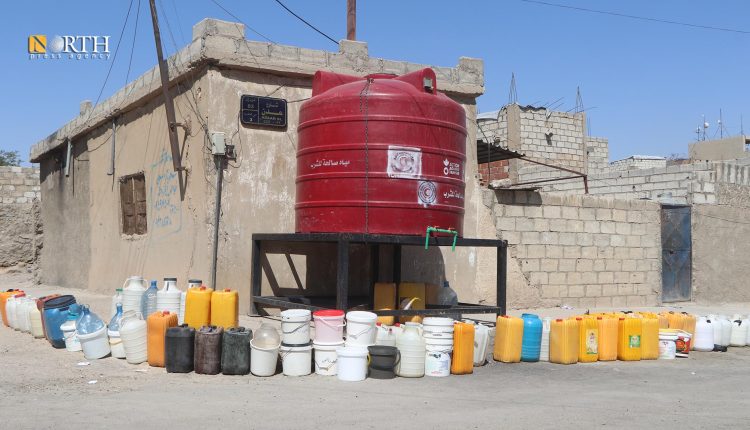Northeast Syrians Face Prolonged Water Crisis as Political Talks Raise Hopes for Alouk Station Restart
By Kardo Roj
QAMISHLI, Syria (North Press) – Residents of northeastern Syria are cautiously hopeful that clean water may soon return to their homes, following renewed political coordination between the Syrian government and the Kurdish-led Syrian Democratic Forces (SDF). Their calls center on the Alouk Water Station in Ras al-Ain (Sere Kaniye), which has remained non-operational for nearly two years due to ongoing control by Turkish-backed factions.
The station—once the sole provider of drinking water to over half a million people in Hasakah, Tel Tamr, and nearby displacement camps—has been repeatedly cut off since falling under the control of the Turkish-backed Syrian National Army (SNA) following Operation Peace Spring in 2019.
A Lifeline Disrupted
The complete shutdown of the station in June 2023 marked the 28th recorded disruption since the Turkish incursion. Despite repeated calls from the Autonomous Administration of North and East Syria (AANES) and humanitarian appeals from UNICEF and other agencies, water flow has not resumed. The reliance on shallow wells and expensive water trucks has created a public health and economic crisis in the region.
Mohammed Sheikh Saleh, a resident of Tel Tamr, described the daily struggle. “We rely on salty, undrinkable water from wells. To get clean water, we must pay up to 40,000 Syrian pounds per tank—three times a month,” he told North Press.
Local testimonies reveal the extent of hardship. “My hands are cracked from washing with this water,” said Hanif al-Ali, 63. “We can’t afford constant water deliveries, but we have no choice.”
Political Momentum and Regional Stakes
The resumption of talks between Damascus and the SDF in March 2025 may offer a rare chance to resolve longstanding service crises in northeastern Syria. The agreement, signed in Damascus on March 10, outlines the formation of joint committees tasked with addressing key civilian concerns, including water infrastructure, electricity, and regional security coordination.
Last week, the SDF announced the formation of a committee to represent northeast Syria in follow-up discussions with the Syrian government. The delegation includes figures from both political and civil spheres, reflecting a broad regional mandate.
According to SDF officials, these talks aim to foster practical cooperation on essential services while ensuring the region’s autonomous administration and security remain intact.
The Role of AANES and the SDF
The Alouk crisis underscores the broader challenges faced by the AANES in securing access to vital infrastructure located outside its administrative reach. While the SDF has established a degree of stability and protection across large parts of northeastern Syria, areas under Turkish military presence remain flashpoints.
Experts say the consistent water cuts from Alouk illustrate the vulnerabilities of civilian infrastructure in contested zones. “Weaponizing water is a violation of international humanitarian law, but it has become a tactic in this conflict,” said a regional analyst who spoke on condition of anonymity due to security concerns.
The AANES has repeatedly called for international oversight and mediation to ensure uninterrupted service delivery. In 2020, a UN-brokered mechanism briefly restored water flow, but it collapsed shortly after due to lack of sustained enforcement.
Health and Humanitarian Risks
Local health workers warn of rising cases of kidney problems and waterborne illnesses, especially among children. Mahmoud al-Khalaf, a father of two, said his young son now suffers from chronic kidney issues due to prolonged consumption of contaminated water. “We are being forced to choose between thirst and illness,” he said.
The economic burden is no less severe. Monthly water delivery costs range from 100,000 to 150,000 SYP per household, an insurmountable sum for many families already living below the poverty line.
Whether the new Damascus–SDF agreement will lead to the resumption of services like the Alouk station remains uncertain. However, local optimism is cautiously growing.
“There are rumors that Alouk could resume operation soon,” said Saleh. “We just hope this time it’s true.”
Analysts suggest that if water flow is restored, it could mark a significant confidence-building measure in an otherwise fragile political landscape. It may also signal a willingness from both Damascus and the SDF to prioritize humanitarian concerns in their evolving relationship.
As talks progress, the future of northeastern Syria’s infrastructure—and the daily lives of its people—hangs in the balance. For now, families continue to wait, hauling buckets and buying water, as hopes ride on words turning into action.

